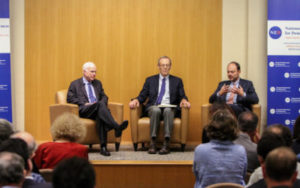 The strategy of a U.S.-led coalition of liberal-democratic, chiefly European states should have three objectives – the liberation of Ukraine, restoration of its free government and institutions, rebuilding of its economy, and guarantee of its independence by placing it in a position of well-armed security against a similar attack in the future, argues Eliot A. Cohen, a professor at The Johns Hopkins University School of Advanced International Studies, and the Arleigh Burke chair in strategy at CSIS.
The strategy of a U.S.-led coalition of liberal-democratic, chiefly European states should have three objectives – the liberation of Ukraine, restoration of its free government and institutions, rebuilding of its economy, and guarantee of its independence by placing it in a position of well-armed security against a similar attack in the future, argues Eliot A. Cohen, a professor at The Johns Hopkins University School of Advanced International Studies, and the Arleigh Burke chair in strategy at CSIS.
The West faces not an ideological challenge comparable to Nazism or Communism but a vicious form of nationalism entrenched in a country that saw a million more deaths than births last year, that is burdened with a corrupt and limited economy, and that is led by an isolated, aging dictator, he writes for The Atlantic.
“Do prove that you are indeed Europeans” – thus did the Ukrainian president, Volodymyr Zelensky, challenge EU leaders, in a passionate, unscripted video address to the European Parliament, delivered from his spartan wartime office in Kyiv, adds Timothy Garton-Ash.
 The European parliament replied with a motion saying that EU institutions should “work towards” granting Ukraine the candidate status the Ukrainian president has asked for in all his wartime conversations with EU leaders, but “on the basis of merit”. Merit? Honestly, what greater merit could there be than being prepared to lay down your life to defend the fundamental values of human dignity, freedom, democracy, and human rights enshrined in Article 2 of the EU treaty? he writes for the European Council on Foreign Relations.
The European parliament replied with a motion saying that EU institutions should “work towards” granting Ukraine the candidate status the Ukrainian president has asked for in all his wartime conversations with EU leaders, but “on the basis of merit”. Merit? Honestly, what greater merit could there be than being prepared to lay down your life to defend the fundamental values of human dignity, freedom, democracy, and human rights enshrined in Article 2 of the EU treaty? he writes for the European Council on Foreign Relations.
Without economic modernization and diversification in combination with democratization, decentralization, and genuine federalism, Russia will slide toward an existential crisis, says the Jamestown Foundation’s co-author of Eurasian Disunion: Russia’s Vulnerable Flanks and author of the forthcoming Failed State: A Guide to Russia’s Rupture.
Putin and his security services, Kremlin-tied oligarchs, corrupt officials, and the privileged class of civil servants are not prepared to endanger their power and purses by pursuing reforms that would give citizens a choice through democratic elections. On the other hand, without economic modernization and diversification in combination with democratization, decentralization, and genuine federalism, Russia will slide toward an existential crisis, he writes for The National Interest.
 The poor performance of Russia’s military is partly a consequence of the regime’s kleptocratic proclivities, analysts suggest.
The poor performance of Russia’s military is partly a consequence of the regime’s kleptocratic proclivities, analysts suggest.
“The Kremlin spent the last 20 years trying to modernize its military,” said Andrei V. Kozyrev, Russia’s foreign minister under Boris Yeltsin, in a post on Twitter. “Much of that budget was stolen and spent on mega-yachts in Cyprus. But as a military advisor you cannot report that to the President. So they reported lies to him instead. Potemkin military.”
As the world’s democracies rightly prioritize helping Ukraine withstand Putin’s aggression, they should not overlook the other important task: helping Russian citizens gain access to objective information about the war and the Putin regime in general, argues Russian opposition politician and author Vladimir Kara-Murza.

Vladimir Kara Murza (far right) with NED’s Carl Gershman (center) and Senator John McCain
Now that the Kremlin has silenced all independent media voices, democratic nations must step up efforts to provide news coverage for Russian citizens in the Russian language, as they did during Soviet times when Radio Liberty, the BBC Russian Service and other Western broadcasters reached millions of listeners inside the Soviet Union. (It comes as little surprise that Putin’s regime is cracking down on these outlets as well), he writes for The Washington Post:
According to Soviet dissidents and Western analysts alike, foreign broadcasts played a crucial role in delegitimizing the totalitarian system in the eyes of its own citizens — and paving the way for the end of the Cold War. There are plenty of technological solutions that can help Russians overcome the government’s censorship firewall. It is only a question of will and committing the right resources.







